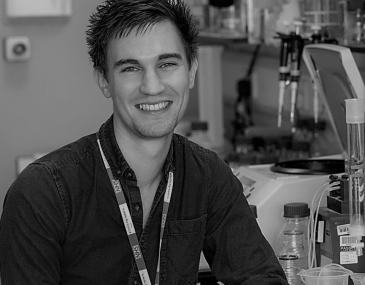Dr Chris H. Hill, MA, MRes, PhD.
I read Biological Natural Sciences at Cambridge (2007-2010) prior to completing MRes (2011) and PhD (2015) degrees on the Wellcome Trust Infection and Immunity programme. During this time I trained in structural and molecular biology in the laboratories of Dr Janet Deane and Prof. Randy Read at the Cambridge Institute for Medical Research (CIMR). I then moved to the MRC Laboratory for Molecular Biology to work with Dr Lori Passmore (2015-2018) before recently joining the Department of Pathology to work with Prof. Ian Brierley as a Research Associate in the Division of Virology.
I supervise first year students studying Part 1A Biology of Cells (Natural Sciences Tripos). For me, a key part of each supervision is a focus on the experimental approaches that are behind the facts in the textbooks, and I encourage students to engage with current research papers in a critical way. I also aim to use my supervisions as an active discussion forum to help students connect concepts from different parts of the course. Only by drawing key ideas together can we understand how the complexity of the cell as a whole is much greater than the sum of its parts. In addition to supervisions, I participate in academic development seminars, delivering techniques lectures and examples classes where we focus on past-paper questions. I am also an undergraduate admissions interviewer.
Many fundamental cellular processes are altered in the context of viral infection, including translation of mRNA by the ribosome. Using a combination of X-ray crystallography, cryo-EM, biophysical and biochemical techniques, I study the molecular mechanisms of -1 programmed ribosomal frameshifting - a phenomenon observed in many RNA viruses (e.g. Encephalomyocarditis virus, HIV-1, SARS coronavirus). More generally, my interests include RNA biology, large macromolecular assemblies, host-pathogen interactions and regulation of gene expression. I previously worked on elucidating the structure and mechanism of the eukaryotic pre-mRNA 3' end processing machinery (cleavage and polyadenylation factor). I also have a long-standing interest in glycosphingolipid metabolism. My PhD focused on Krabbe Disease: a devastating neurodegenerative disorder caused by loss of GALC function. I characterised the GALC catalytic cycle, determined the mechanism by which lipid-transfer proteins present substrate to the enzyme and investigated how different disease mutations affect enzyme folding, intracellular trafficking and catalytic function.
I provide mentoring, experimental training and general supervision for PhD students. I have also supervised several short projects for undergraduate summer students.
